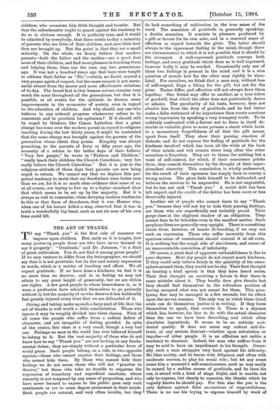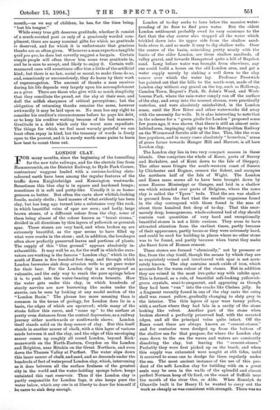THE ART OF THANKS.
TO say "Thank you" is the first rule of manners we
Giving and taking make up such a large Dart of life that the -art of thanks is well worth a little consideration. Those who ignore it may be roughly divided into three classes. First of all come the people who suffer from a radical defect of • character, and are incapable of feeling grateful. In spite • of the cynics, this class is a very small, though a very bad one. Perhaps no man in the world has ever believed himself to belong to it. But the vast majority of those who do not know how to say "Thank you" are not lacking in any funda- mental virtue; they are simply without a particular form of social grace. Such people belong, as a rule, to two opposite • species,—those who cannot express their feelings, and those
• who cannot hide them. By those who cannot hide their feelings we do not mean those who will not "practise to 'deceive," but those who take no trouble to suppress the expression of transitory and superficial emotions, whose sincerity is not tempered by any sense of proportion, and who have never learned to expose to the public gaze only such sentiments as are in some degree permanent in their minds. Such people are natural, and -very cf ten lovable, but they
do lack something of cultivation in the true sense of the word. The sensation of gratitude is, generally speaking, a double sensation. It consists in pleasure produced by a gift or favour for its own sake, and in a renewed sense of affection or regard towards the giver. The latter should always be the uppermost feeling in the mind, though there are circumstances in which it is not possible that it should be the strongest. A well-expressed gratitude conveys both feelings, and every gratitude which does so is well expressed, however badly it may be worded. Occasionally only one of these two feelings is present in the mind, and it is a nice question of morals how far the other may rightly be simu- lated. For ourselves, we think that a man may, without loss of self-respect, feign a liking for the gift, but not for the giver. Tastes differ, and affection will not always draw them together. One friend may offer to another, as a true token of goodwill, that which the other does not particularly desire or admire. The peculiarity of his taste, however, does not absolve him from the duty of gratitude, and he had better make a false statement of no importance than create a serious wrong impression by speaking a very trumpery truth. To be suddenly confronted with a favour not to them in itself de- sirable or valuable gives to some persons a shock which leads to a momentary forgetfulness of all that the gift means apart from itself. They show their passing emotion of distaste, and do not express the feeling of gratitude for the kindness involved which has been all the while at the back of their minds, and will remain there long after the other sensation is forgotten. They are to blame for nothing but a want of self-control, for which, if their conscience pricks them, they console themselves by the thought of their super- abundant sincerity. This consolation is wholly undeserved, for the result of their openness has simply been to convey a wrong notion. The giver feels himself to be defrauded, and believes the receiver to be ungrateful. He is not ungrateful, but he has not said "Thank you." A social debt has been left unpaid, and the credit of the debtor has been more or less deservedly injured.
Another set of people who cannot learn to say "Thank you," because they will not try to hide their passing feelings, are those who are superficially and irritably proud. Their gorge rises at the slightest shadow of an obligation. They cannot bear to be beholden even in the smallest matter. Such people as these are generally very upright. There is something about them, however, of innate ill-breeding, if we may use such an expression. Those who suffer incurably from this spurious sense of resentment should conceal it at all costs. It is nothing but the rough side of slavishness, and comes of an unaccountable conviction of inferiority.
Of course, a great deal of apparent unthankfulness is due to pure shyness. Most shy people do not expect much kindness. If they could only believe firmly in the geniality of the atmo- sphere around them, they would not be shy. Their first thought on bearing a kind speech is that they have heard amiss. Their first thought on receiving a favour is that there is some mistake about it. They hardly dare give thanks lest they should find themselves in the ridiculous position of having accepted what was not meant for them. This para- lysing fear may be assuaged in a few seconds, but its effect upon the nerves remains. The only way in which these timid souls can do themselves justice is in writing. If they force themselves to speak, they overdo it. There is a shyness which has, however, far less to do with the actual character than the one we have been describing, and which often simulates ingratitude. It seems to be an entirely acci- dental quality. It does not mean any radical self-dis- trust, or any serious distrust—whether upon calculation or impulse—of other people. It is an affliction not unlike a tendency to stammer. Indeed, the man who suffers from it may be said to have an impediment in his thought. Gener- ally such a man struggles very hard against his infirmity. He likes society, and he learns with diligence, and often with moderate success, to play his social role ; but let any event cause him a -moment's self-consciousness, such as may easily be caused by a sudden access of gratitude, and he loses his cue, is seized with a kind of stage fright, and is unable, not only to express, but clearly to conceive, the thanks which he -vaguely knows he should pay. For him also the pen is the only defence against false accusations of ungratefulness. There is no use his trying to express himself by word of
mouth,—as we say of children, he has, for the time being, "lost his tongue."
*While every true gift deserves gratitude, whether it consist of a much-coveted post or only of a graciously worded com- pliment, there are many nominal gifts for which no gratitude is deserved, and for which it is unfortunate that gracious thanks are so often given. Whenever a man expects a tangible quid pro quo, he does but covertly suggest a bargain. Certain simple people will often throw him some true gratitude in, and he is sure to accept, and likely to enjoy it. Certain well- mannered ones will sometimes offer him a little of the artificial kind; but there is no law, social or moral, to make them do so, ancl, consciously or unconsciously, they do harm by their work of supererogation. The amount of thanks a man receives during his life depends very largely upon his accomplishment as a giver. There are those who give with so much simplicity that they conciliate the proud, set the shy at their ease, and dull the selfish sharpness of critical perceptions ; but the obligation of returning thanks remains the same, however awkwardly it may be laid upon us. No man has any right to consider his creditor's circumstances before he pays his debt, or to keep his creditor waiting because of his bad manners. Gratitude is a debt which only the worst men repudiate. The things for which we feel most warmly grateful we can least often repay in kind, but the treasury of words is freely open to the poorest, and it is surely worth some pains to learn how best to count them out.











































 Previous page
Previous page